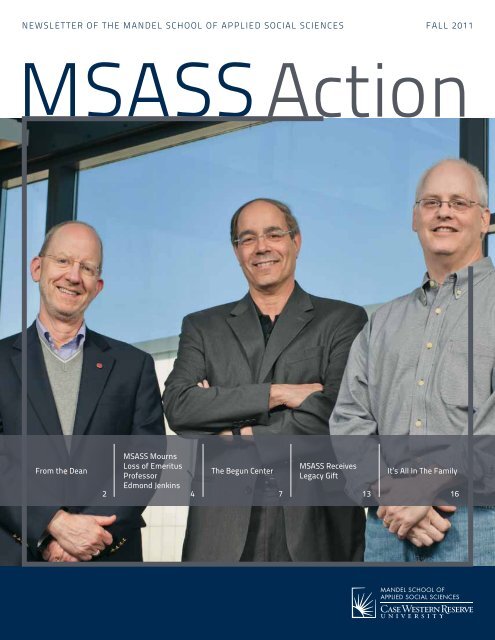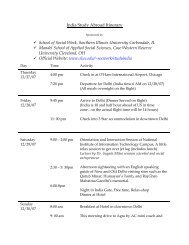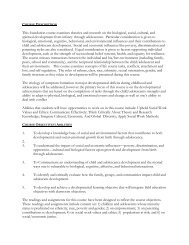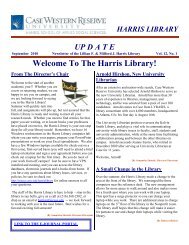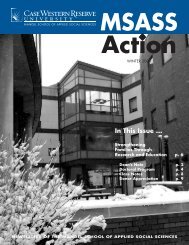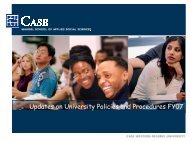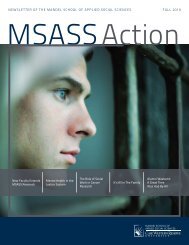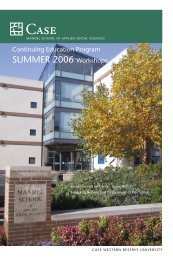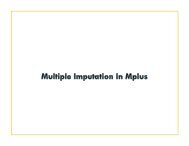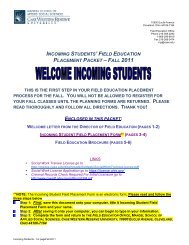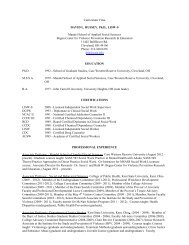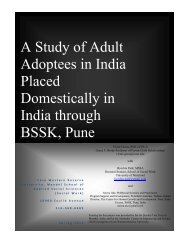Fall 2011 - Mandel School of Applied Social Sciences - Case ...
Fall 2011 - Mandel School of Applied Social Sciences - Case ...
Fall 2011 - Mandel School of Applied Social Sciences - Case ...
Create successful ePaper yourself
Turn your PDF publications into a flip-book with our unique Google optimized e-Paper software.
Newsletter <strong>of</strong> the <strong>Mandel</strong> <strong>School</strong> <strong>of</strong> <strong>Applied</strong> <strong>Social</strong> <strong>Sciences</strong><br />
FALL <strong>2011</strong><br />
msass Action<br />
From the Dean<br />
2<br />
MSASS Mourns<br />
Loss <strong>of</strong> Emeritus<br />
Pr<strong>of</strong>essor<br />
Edmond Jenkins<br />
4<br />
The Begun Center<br />
7<br />
MSASS Receives<br />
Legacy Gift<br />
13<br />
It’s All In The Family<br />
16
From<br />
The<br />
Dean<br />
In my years as a dean, I have been asked some<br />
really tough questions. Sometimes I have to dig<br />
deep and come up with an answer that makes<br />
the most sense. Other times, I have to think hard,<br />
and then admit that I don’t know all the answers.<br />
msass Action<br />
FALL <strong>2011</strong><br />
So when I attended a recent meeting among my<br />
colleagues within higher education, I was asked a<br />
very pointed question:<br />
“How does a Top 10 social work school like<br />
MSASS continue to maintain its superior<br />
rankings in Ohio, the U.S. and throughout<br />
the world”<br />
I admit I had to think about that for a minute,<br />
because, I wanted to answer, “Where do I begin”<br />
Over the years, I’ve come to realize that our<br />
ranking as a No. 10 school by U.S. News & World<br />
Report is based on so many things. A dedicated<br />
faculty. Outstanding staff who support our<br />
students in every way possible. And a strong<br />
network <strong>of</strong> alumni and friends who care.<br />
This month, MSASS will again be placed under a<br />
proverbial microscope. This is the time <strong>of</strong> year<br />
when deans all over the U.S. will be making their<br />
top picks for social work schools. It happens<br />
every four years and the results are published in<br />
U.S. News & World Report.<br />
Much has changed at MSASS since 2008. So as I<br />
complete my own ballot as a dean, I wonder if my<br />
peers in higher education are even aware <strong>of</strong> all<br />
the wonderful things we’ve accomplished as a<br />
top 10 social work school. There are so many<br />
accomplishments — too numerous to mention<br />
— that a lot <strong>of</strong> people don’t see every day when<br />
they walk through our doors. For example:<br />
3 Faculty News<br />
5 News from the Doctoral Program<br />
12 Active Aging Symposium Draws Local, International Experts<br />
13 We Remember<br />
14 Student Spotlight<br />
16 It’s all in the Family<br />
18 Class Notes<br />
Features<br />
7 The Begun Center: Expanding the Knowledge<br />
and Lessening the Impact <strong>of</strong> Youth Violence<br />
13 MSASS Receives Legacy Gift<br />
15 Field Education<br />
19 New Courses for Undergraduates<br />
Offered at MSASS<br />
Cover: Begun Center Leadership (l-r) Patrick Kanary, M.Ed.,<br />
Mark I. Singer, Ph.D., Daniel J. Flannery, Ph.D.<br />
continued on page 6<br />
2 MSASS Action
FACULTYNEWS<br />
Kathryn Betts Adams<br />
David E. Biegel<br />
In July, Kathryn Betts Adams<br />
was named associate pr<strong>of</strong>essor<br />
with tenure. She teaches in the<br />
Direct Practice Concentration on<br />
Aging as well as Research and<br />
Theory classes.<br />
Henry L. Zucker Pr<strong>of</strong>essor <strong>of</strong> <strong>Social</strong><br />
Work Practice David E. Biegel has<br />
co-authored “Family support and<br />
family caregiving across disabilities:<br />
Conceptual frameworks, research,<br />
and policy.”<br />
Last spring, Robert Fischer,<br />
research associate pr<strong>of</strong>essor and<br />
co-director <strong>of</strong> the Center on Urban<br />
Poverty and Community<br />
Development, spoke about the<br />
evaluation <strong>of</strong> NGOs and NGO<br />
capacity building for a Cleveland<br />
Council on World Affairs panel for<br />
Rob Fischer visiting Korean leaders. In May, he<br />
received the Roberta O’Keefe<br />
Recognition Award for outstanding service to Ohio<br />
Program Evaluators’ Group (OPEG). Fischer recently<br />
presented a paper on promoting a medical home for<br />
families in poverty at the National Research<br />
Conference on Child and Family Policy and Programs<br />
in Bridgewater, Mass. In August, he co-authored a<br />
paper with Amanda Wilsker and Dennis Young, which<br />
was published in Nonpr<strong>of</strong>it and Voluntary Sector<br />
Quarterly. The paper was entitled, “Exploring the<br />
Revenue Mix <strong>of</strong> Nonpr<strong>of</strong>it Organizations: Does It<br />
Relate to Publicness” He is also featured in a video<br />
presentation on program evaluation entitled,<br />
“Showing That Your Work Matters.” You can find the<br />
video on YouTube and learn more about it through the<br />
Foundation Center in Cleveland.<br />
Associate Pr<strong>of</strong>essor Kathleen J.<br />
Farkas is planning a new travel<br />
study course with Adjunct<br />
Pr<strong>of</strong>essor Richard Romaniuk. The<br />
course is entitled, “Invisible Groups<br />
in a New Poland.” This is the first<br />
year the course will be <strong>of</strong>fered in<br />
March, 2012. Farkas also was<br />
Kathleen J. Farkas featured on WCPN-90.3 as a guest<br />
<strong>of</strong> radio host David C. Barnett, and<br />
spoke about the Women’s Re-entry Network and a<br />
creative writing program for women at the Cuyahoga<br />
County Corrections Center.<br />
Anna Maria Santiago, faculty<br />
associate <strong>of</strong> the Center on Urban<br />
Poverty and Community<br />
Development and Leona Bevis/<br />
Marguerite Haynam Pr<strong>of</strong>essor <strong>of</strong><br />
Community Development at<br />
MSASS, was named a <strong>2011</strong> Mentor<br />
Fellow by the University Center for<br />
Anna M. Santiago Innovation in Teaching and<br />
Education at CWRU. She also was<br />
awarded a grant by the U.S. Department <strong>of</strong> Housing<br />
and Urban Development to serve as one <strong>of</strong> two<br />
principal investigators for a research project entitled,<br />
“Opportunity Neighborhoods for Latino and African<br />
American Children.” Over the last few months, Santiago<br />
also co-authored several recent and upcoming<br />
publications on low-income homeownership. Her work<br />
also appeared in a book published by Brill Publishers<br />
entitled, Fair and Affordable Housing Policy in the<br />
United States: Trends, Outcomes, Future Directions.<br />
She co-authored a number <strong>of</strong> papers that were<br />
presented at the annual meetings <strong>of</strong> the Urban Affairs<br />
Association and Society for the Study <strong>of</strong> <strong>Social</strong><br />
Problems in New Orleans.<br />
Aloen Townsend<br />
In September, Aloen L. Townsend,<br />
pr<strong>of</strong>essor and chair <strong>of</strong> the doctoral<br />
program at MSASS, was named a<br />
Mather Spotlight Prize honoree by<br />
The Flora Stone Mather Center for<br />
Women at CWRU. She was one <strong>of</strong><br />
eight honorees, each chosen by her<br />
school or college for excellence in<br />
scholarship and research.<br />
FALL <strong>2011</strong> 3
News from<br />
our Alumni<br />
MSASS Mourns Loss <strong>of</strong><br />
Emeritus Pr<strong>of</strong>essor Edmond Jenkins<br />
Margaret Adamek (Ph.D.<br />
’89), director <strong>of</strong> the<br />
Indiana University <strong>School</strong><br />
<strong>of</strong> <strong>Social</strong> Work Ph.D.<br />
program, has received a<br />
Fulbright Award to<br />
undertake a five-month<br />
Margaret Adamek<br />
teaching project in<br />
Ethiopia with the Addis Ababa University<br />
<strong>School</strong> <strong>of</strong> <strong>Social</strong> Work and <strong>Social</strong><br />
Development. Adamek has been working<br />
with AAU since 2008 in the development <strong>of</strong><br />
its doctoral program. This year’s project will<br />
focus on one-on-one consulting sessions<br />
with doctoral students. She will also<br />
facilitate small group seminars on practical<br />
topics such as “Assembling the Research<br />
Portfolio,” “Selecting a Feasible Dissertation<br />
Topic,” and “Preparation for the Final<br />
Defense.” She has organized a similar<br />
dissertation series at Indiana University.<br />
Amy R. Krentzman<br />
(Ph.D. ‘08) spoke at<br />
MSASS on October 14 on<br />
“Straight Talk from a<br />
Postdoc: The Experiences<br />
<strong>of</strong> a Postdoctoral<br />
Research Fellow and<br />
MSASS Ph.D. Alum.” She<br />
Amy R. Krentzman<br />
joined the University <strong>of</strong><br />
Michigan Addiction Research Center as a<br />
Postdoctoral Research Fellow in 2009 and<br />
recently received a two-year training grant<br />
from the Michigan Institute for Clinical and<br />
Health Research to study positive<br />
psychology and addiction treatment. Her<br />
research focuses on the application <strong>of</strong><br />
positive psychology to addiction treatment<br />
and recovery.<br />
MSASS faculty and staff<br />
were saddened by the<br />
death <strong>of</strong> Emeritus<br />
Pr<strong>of</strong>essor Edmond Jenkins<br />
on August 4. Pr<strong>of</strong>essor<br />
Jenkins held dual degrees<br />
from <strong>Case</strong> Western<br />
Reserve University,<br />
including an M.A. in<br />
Theater from the College<br />
<strong>of</strong> Arts and <strong>Sciences</strong> (’56),<br />
and an MSSA (’66) from<br />
the <strong>School</strong> <strong>of</strong> <strong>Applied</strong><br />
<strong>Social</strong> <strong>Sciences</strong>. He<br />
earned his B.A. from<br />
Howard University in<br />
Washington, D.C.<br />
Pr<strong>of</strong>essor Jenkins taught at the <strong>Mandel</strong> <strong>School</strong> from 1969 to<br />
his retirement in 1992. He directed “Project Go,” used theater<br />
methods to teach social work classes and created the school’s<br />
first audio-visual collection. He was named “Outstanding<br />
Teacher” in 1982 and was honored at his retirement by<br />
delivering the commencement address to the graduating class<br />
<strong>of</strong> 1992. After retirement, he was an active member <strong>of</strong> the<br />
emeriti faculty group.<br />
Before coming to the <strong>School</strong> <strong>of</strong> <strong>Applied</strong> <strong>Social</strong> <strong>Sciences</strong>, he was<br />
a teen group worker at Garden Valley Neighborhood House in<br />
Cleveland, was promoted to group work supervisor there and<br />
later became acting director. After receiving his MSSA, he<br />
worked as a clinical social work supervisor at a state hospital<br />
in Michigan.<br />
While in Michigan, Pr<strong>of</strong>essor Jenkins helped found the Ionia<br />
Community Theatre. When he returned to Cleveland he was<br />
active at Karamu House and the East Cleveland Community<br />
Theater.<br />
For those <strong>of</strong> us who knew him, there wasn’t anyone brighter or<br />
with a more biting sense <strong>of</strong> humor. For those who did not know<br />
him, Pr<strong>of</strong>essor Jenkins was a gourmet cook who coordinated all<br />
<strong>of</strong> our faculty/staff potlucks, considered the entire month <strong>of</strong><br />
April his “birthday” and was devoted to performing, writing and<br />
directing theater.<br />
Please join us for a “Celebration <strong>of</strong> Life” for Pr<strong>of</strong>essor Edmond<br />
Jenkins on Monday, November 14 from 3 to 5 p.m. in Room 320<br />
at the <strong>Mandel</strong> <strong>School</strong>. Come share your stories and memories.<br />
Light refreshments will be served.<br />
4 MSASS Action
News from the Doctoral Program<br />
Aloen Townsend<br />
We are delighted to welcome seven new students to our doctoral program this year. As you can see<br />
from their brief biographical sketches, they are diverse in terms <strong>of</strong> their academic backgrounds,<br />
research interests, gender, race and ethnicity, and countries <strong>of</strong> origin. What they all share is a passion<br />
for social work and social welfare, and a desire to pursue doctoral training in order to contribute to the<br />
pr<strong>of</strong>ession as exceptional teachers, researchers and leaders. We are proud that they have chosen to<br />
pursue their educational dreams at MSASS. They are now part <strong>of</strong> a community consisting <strong>of</strong> 55 current<br />
doctoral students. Of our current students, 42 percent are taking coursework, 13 percent are preparing<br />
the qualifying examination this year or writing their prospectus, and 45 percent are working on their<br />
dissertation (post prospectus).<br />
<strong>2011</strong> Cohort<br />
Jamie Cage received her B.A. in<br />
psychology and her M.S. in community<br />
mental health counseling from The<br />
University <strong>of</strong> Rochester. Over the<br />
years, she has been exploring the<br />
foster care system and its impact on<br />
adolescent and adult mental health.<br />
She will develop additional research in<br />
foster care while a student at MSASS.<br />
Youngmin Cho graduated from Seoul<br />
National University with a B.S. in<br />
social welfare and a double major in<br />
economics. He has worked in the field<br />
<strong>of</strong> social welfare and wants to<br />
continue researching economically<br />
disadvantaged populations and policy<br />
analysis for low-income working<br />
families.<br />
Chia-Ling Chung received her MSW<br />
and BSW from National Taiwan<br />
University. Her “Best <strong>Social</strong> Work<br />
Thesis” award in <strong>2011</strong> focused on<br />
mental health issues and caregiving.<br />
Her research at MSASS will address<br />
the mental health delivery system as it<br />
relates to recovery/rehabilitation and<br />
care aspects.<br />
Hyunyong Park is a recent MSSW<br />
graduate <strong>of</strong> the University <strong>of</strong> Texas at<br />
Austin. He received his B.A. in social<br />
welfare and an M.A. in social welfare<br />
from Seoul National University. He is<br />
an experienced counselor and has an<br />
interest in the evidence-based<br />
treatment <strong>of</strong> mental health, substance<br />
use disorders and dual diagnosis.<br />
Front row: left to right - Tanisha Tate, Gabriela Sehinkman, Susan Yoon, Chia-Ling Chung<br />
Back row: left to right - Jamie Cage, Youngmin Cho, Hyunyong Park<br />
Gabriela Sehinkman has a master’s<br />
degree in psychology from the<br />
University <strong>of</strong> Buenos Aires and a<br />
master’s degree in social work from<br />
Cleveland State University. She plans to<br />
focus her research on culturallyeffective<br />
interventions for minorities,<br />
especially within the Latino community.<br />
Tanisha K. Tate holds a bachelor’s<br />
degree in biology and a master’s in<br />
public health policy from the University<br />
<strong>of</strong> Michigan. Her primary research<br />
interests include community<br />
revitalization, urban poverty, housing,<br />
education and effective economic<br />
development strategies for rebuilding<br />
neighborhoods.<br />
Susan Yoon graduated from Ewha<br />
Woman’s University in Seoul, South<br />
Korea with a B.A. in social work and an<br />
MSW. Her field <strong>of</strong> research involves<br />
the prevention <strong>of</strong> child maltreatment,<br />
and enhancing the well-being <strong>of</strong><br />
cultural and ethnic minority children<br />
using culturally competent<br />
interventions.<br />
From the Doctoral Suite…<br />
Susan Smalling (2008 Cohort) has been<br />
awarded the <strong>2011</strong> Arol Shack<br />
Dissertation Award. Her dissertation is<br />
entitled “American Indians and <strong>Social</strong><br />
Work Education: Addressing Issues <strong>of</strong><br />
Recruitment, Retention and Inclusion.”<br />
Associate Pr<strong>of</strong>essor David Miller is her<br />
dissertation chair. The qualitative study<br />
is designed to give an in-depth account<br />
<strong>of</strong> the experiences and viewpoints <strong>of</strong><br />
American Indian faculty in social work.<br />
FALL <strong>2011</strong> 5
Take a Trip with MSASS!<br />
Take an educational holiday overseas and earn 15 continuing education credits. Groups are traveling to<br />
Bangladesh, Ecuador, The Netherlands, Guatemala and Poland during Winter Break or Spring Break.<br />
Join students, alumni and other pr<strong>of</strong>essionals for several travel abroad opportunities. Each trip is led by faculty<br />
from the <strong>Mandel</strong> <strong>School</strong> <strong>of</strong> <strong>Applied</strong> <strong>Social</strong> <strong>Sciences</strong>. Travel options also are designed around opportunities to<br />
interact with international policymakers and direct-service providers. For more information contact Debby<br />
Jacobson, Ph.D., Director <strong>of</strong> International Education Programs.<br />
Winter Break<br />
Bangladesh<br />
<strong>Social</strong> Dev/Micro-Finance<br />
Travel Dates: Dec 29, <strong>2011</strong> - Jan 13, 2012<br />
Ecuador<br />
Health, Human & <strong>Social</strong> Development<br />
Travel Dates: Jan 2 - Jan 15, 2012<br />
Spring Break<br />
Guatemala<br />
Com Dev Approach to Child Welfare<br />
Travel Dates: March 9-18, 2012<br />
Netherlands<br />
Soc Justice: Health & Violence Prevention or<br />
Integrated Mental Health & Substance Use<br />
Travel Dates: March 9-18, 2012<br />
Poland<br />
Invisible Groups in a New Poland<br />
Travel Dates: March 9-18, 2012<br />
From The Dean continued<br />
Did you know we are ranked No. 3 by members <strong>of</strong> NASW Did you<br />
know MSASS is ranked No. 11 by deans at other social work schools<br />
Rankings like these are worth mentioning, so we recently updated our<br />
web site to reflect it. Once folks have a chance to read them, they no<br />
longer need to wonder, “What makes MSASS so great”<br />
http://msass.case.edu/about/ranking.html<br />
Rankings among peers and students wouldn’t be possible without the<br />
support <strong>of</strong> our graduates, however. So we’d like to know how well we<br />
rank with you, our alumni. Are you pleased with the education you<br />
received at MSASS Do you want to be more involved with how we<br />
recruit and promote ourselves to others in the world<br />
Let us know your ideas and suggestions. We always want to know<br />
how we can provide value to you as a proud graduate <strong>of</strong> MSASS. Each<br />
<strong>of</strong> us has benefited immensely from the <strong>Mandel</strong> <strong>School</strong> in so many<br />
ways, and your words and actions show it.<br />
I enjoy reading all the wonderful e-mails and handwritten notes from<br />
alumni who are still willing to make a difference because we made a<br />
difference. That level <strong>of</strong> commitment can only be understood by the<br />
graduates who understand the essence <strong>of</strong> what we call MSASS.<br />
Grover “Cleve” Gilmore, Dean<br />
6 MSASS Action
The Begun Center:<br />
Expanding the Knowledge and<br />
Lessening the Impact <strong>of</strong> Youth Violence<br />
Paul M. Kubek, M.A.<br />
There is no denying the impact <strong>of</strong> news-making incidents <strong>of</strong> violence, such as<br />
school shootings and armed stand<strong>of</strong>fs between fugitives and police. They<br />
shock and disorient everyone involved, not only victims but also first<br />
responders, eyewitnesses and viewers who are safely situated in front <strong>of</strong> televisions<br />
and smart phones, observing from the vantage point <strong>of</strong> a hovering helicopter that is<br />
hundreds <strong>of</strong> feet above the scene. Yet, less dramatic incidents <strong>of</strong> violence, those that<br />
occur every day, have negative effects that are just as staggering. There are<br />
numerous children, adolescents and adults in our communities who are victims <strong>of</strong><br />
and witnesses to assaults within their own homes and neighborhoods. Many are<br />
exposed to violence frequently on the job or through media outlets, such as television<br />
news and dramas, movies, internet videos and interactive video games.<br />
continued on next page<br />
FALL <strong>2011</strong> 7
For over 10 years, researchers and trainers from the Begun<br />
Center for Violence Prevention Research and Education at the<br />
<strong>Mandel</strong> <strong>School</strong> <strong>of</strong> <strong>Applied</strong> <strong>Social</strong> <strong>Sciences</strong> have been studying<br />
the impact <strong>of</strong> violence exposure upon physical health, mental<br />
health and social functioning. They have been developing and<br />
disseminating interventions that work to minimize and reverse<br />
the negative consequences.<br />
Among the center’s most notable accomplishments this past<br />
year were the creation <strong>of</strong> a research-based intervention<br />
program for use by police in public housing communities and<br />
the hiring <strong>of</strong> a new full-time director, Daniel Flannery, Ph.D., a<br />
nationally recognized violence researcher who was a pr<strong>of</strong>essor<br />
<strong>of</strong> public health at Kent State University and founding director<br />
<strong>of</strong> its Institute for the Study and Prevention <strong>of</strong> Violence.<br />
Flannery has been a long-time collaborator with Begun Center<br />
Interim Director Mark Singer, Ph.D., who held that post for five<br />
years, building many research and practice collaborations<br />
within the community and preparing the center for this next<br />
phase in its evolution.<br />
Multidisciplinary Collaborations<br />
Singer, the Leonard W. Mayo Pr<strong>of</strong>essor in<br />
Family and Child Welfare at the <strong>Mandel</strong><br />
<strong>School</strong>, has over 25 years <strong>of</strong> research,<br />
training and consulting experience. He<br />
doesn’t think twice about getting into the<br />
front seat <strong>of</strong> a police cruiser to ride along<br />
on patrol for a closer, more personal look<br />
at the people behind the data he collects.<br />
Throughout his career, Singer has<br />
developed numerous academiccommunity<br />
partnerships, including those<br />
with police and nonpr<strong>of</strong>it organizations<br />
that work in some <strong>of</strong> Cleveland’s toughest<br />
neighborhoods.<br />
He has primarily studied the experiences <strong>of</strong> children and<br />
adolescents who have been exposed to violence as victims or<br />
witnesses. He has been the principal investigator <strong>of</strong> numerous<br />
research and training projects, and he has authored or coauthored<br />
over 40 peer-reviewed articles and book chapters. He<br />
also has conducted training with the U.S. Army, Cleveland<br />
Police and other police departments and school-security<br />
personnel in Northeast Ohio. Singer has extensive clinical<br />
experience, which includes developing and directing two<br />
adolescent inpatient dual-diagnosis psychiatric units. He has<br />
served as chairperson <strong>of</strong> numerous community-wide<br />
committees focusing on youth problems in Cleveland.<br />
We teach <strong>of</strong>ficers how<br />
to approach and to talk<br />
to kids and parents in<br />
a way that’s not going<br />
to make them react<br />
defensively or<br />
<strong>of</strong>fensively<br />
Police-Assisted Referral<br />
Singer recently developed a research-informed intervention,<br />
called Police Assisted Referral (PAR), which is funded by the<br />
U.S. Department <strong>of</strong> Justice. PAR is a partnership among the<br />
Begun Center; the Cuyahoga Metropolitan Housing Authority<br />
(CMHA) Police Department; Children Who Witness Violence, a<br />
program <strong>of</strong> Cuyahoga County Public Safety & Justice Services;<br />
and two nonpr<strong>of</strong>it organizations in Cleveland — Mental Health<br />
Services, Inc. and Partnership for a Safer Cleveland.<br />
PAR teaches police <strong>of</strong>ficers how to recognize signs <strong>of</strong> exposure<br />
to violence among children, adolescents and adults; how to<br />
intervene constructively without provoking escalation <strong>of</strong><br />
problematic behavior; and how to effectively and efficiently<br />
connect people to crisis services, mental-health services, other<br />
human services and healthcare. Police <strong>of</strong>ficers learn to look out<br />
for and respond to calls about domestic violence, child abuse<br />
and exposure to violence. “We teach <strong>of</strong>ficers how to approach<br />
and to talk to kids and parents in a way that’s not going to<br />
make them react defensively or <strong>of</strong>fensively,” Singer says.<br />
“When people don’t feel threatened, they<br />
are more likely to agree to talk to<br />
pr<strong>of</strong>essionals like trauma counselors,<br />
youth counselors and mental-health<br />
counselors.”<br />
PAR is attracting attention nationally and<br />
internationally with a number <strong>of</strong> requests<br />
for consultation from cities in the U.S.<br />
and overseas. This past year, the Begun<br />
Center hosted 13 criminal justice<br />
students and two pr<strong>of</strong>essors from Vrije<br />
University in Amsterdam, The<br />
Netherlands.<br />
The New Director<br />
Although Singer’s role as interim director <strong>of</strong> the Begun Center<br />
ended after five productive years, he continues to lead research<br />
and training projects and collaborate with Flannery, who joined<br />
the <strong>Mandel</strong> <strong>School</strong> on July 1 as the Dr. Semi J. and Ruth W.<br />
Begun Pr<strong>of</strong>essor. Flannery is a good fit with the Begun Center<br />
philosophy and approach. Like Singer, he has a clinical<br />
background.<br />
He also takes a multidisciplinary and multi-systemic<br />
approach to his work, collaborating with researchers,<br />
community leaders and practitioners in law enforcement,<br />
criminal justice, youth and family services, and public health,<br />
among others. He currently has over $6 million in funded<br />
8 MSASS Action
Foundation Grant Continues<br />
Work <strong>of</strong> Begun Center,<br />
Cleveland Partnership<br />
Members <strong>of</strong> the Begun Center Team<br />
research, evaluation and training projects, and he is bringing many <strong>of</strong><br />
them to the Begun Center. Sources <strong>of</strong> funding for Flannery’s current<br />
projects include federal agencies such as the Centers for Disease<br />
Control and Prevention (CDC), the Substance Abuse and Mental Health<br />
Services Administration (SAMHSA), and the U.S. Department <strong>of</strong> Justice,<br />
as well as the Ohio Department <strong>of</strong> Mental Health (ODMH), county<br />
agencies and local foundations. He has published widely in pr<strong>of</strong>essional<br />
journals in multiple disciplines.<br />
Flannery brings to the <strong>Mandel</strong> <strong>School</strong> a multidisciplinary team <strong>of</strong> 20<br />
researchers, evaluators, consultants and trainers who have master’sand<br />
doctoral-level training in social work, anthropology, education,<br />
sociology, psychology, law, nursing and criminal justice. He also brings the<br />
Center for Innovative Practices (CIP), a State <strong>of</strong> Ohio Coordinating Center<br />
<strong>of</strong> Excellence initiative, which disseminates mental-health interventions<br />
for youth. CIP is directed by Patrick J. Kanary, M.Ed. Among Flannery’s<br />
current projects is the continuation <strong>of</strong> Project Tapestry, a system-<strong>of</strong>-care<br />
demonstration and research project in Cuyahoga County, funded by<br />
SAMHSA. This project is examining the facilitators and barriers <strong>of</strong><br />
intersystem collaboration and how violence prevention and intervention<br />
services might influence changes in youth and family behavior over time.<br />
Flannery’s team provides the evaluation <strong>of</strong> the program.<br />
Another project is the Fugitive Safe Surrender Program, initially funded by<br />
the United States Marshal Services (USMS). Flannery helped start the<br />
program in northeast Ohio in 2005. It has been replicated in 21 different<br />
cities throughout the United States with over 35,000 people having<br />
surrendered non-violently nationwide. Flannery’s team develops and<br />
administers surveys at these events and provides evaluation <strong>of</strong> the data.<br />
The Sam and Maria Miller Foundation also provided major support for<br />
this program.<br />
A Closer Look At Violence<br />
Ask Flannery and Singer to explain what lies at the core <strong>of</strong> the problem <strong>of</strong><br />
exposure to violence and they will remind you that the obvious<br />
consequences are physical trauma and medical conditions. Yet, there are<br />
also not so obvious psychosocial conditions which not only harm<br />
individuals and families but neighborhoods, schools and communities as<br />
continued on next page<br />
Researchers from<br />
the Dr. Semi J. and<br />
Ruth W. Begun<br />
Center at the <strong>Mandel</strong><br />
<strong>School</strong> <strong>of</strong> <strong>Applied</strong><br />
<strong>Social</strong> <strong>Sciences</strong> will<br />
continue their work<br />
with the Partnership for a Safer Cleveland<br />
over the next two years, thanks to a<br />
$200,000 grant made possible by the Robert<br />
Wood Johnson Foundation. In addition,<br />
matching contributions from The Cleveland<br />
Foundation, Saint Luke’s Foundation and<br />
Sisters <strong>of</strong> Charity Foundation will provide for<br />
a combined total <strong>of</strong> $400,000.<br />
Since 2010, Begun Center researchers have<br />
been working with the Partnership for a<br />
Safer Cleveland and its STANCE Cleveland<br />
initiative to assist public housing <strong>of</strong>ficers<br />
with violence prevention efforts through a<br />
program known as Police Assisted Referrals<br />
(PAR). The funding will continue to support<br />
the collaborative efforts <strong>of</strong> the partnership,<br />
the Begun Center, the police department <strong>of</strong><br />
the Cuyahoga Metropolitan Housing<br />
Authority (CMHA) and Mental Health<br />
Services (MHS).<br />
The program is one <strong>of</strong> the first <strong>of</strong> its kind in<br />
the country, providing Cleveland housing<br />
authority <strong>of</strong>ficers with the training and<br />
resources they need to assist families and<br />
children that experience violence. After a<br />
traumatic event, family members are<br />
immediately linked with health and social<br />
services agencies that can provide education,<br />
mental health screening and treatment.<br />
“With all the divisiveness, finger pointing and<br />
blaming that is occurring on the national and<br />
state levels, it is heartening to collaborate<br />
among foundations, social service providers,<br />
law enforcement, community agencies and<br />
academe to address the important issue <strong>of</strong><br />
exposure to violence among our community’s<br />
youth,” said Mark Singer, Ph.D., Begun Center<br />
deputy director and Leonard W. Mayo<br />
Pr<strong>of</strong>essor <strong>of</strong> Family and Child Welfare.<br />
The announcement <strong>of</strong> the grant was<br />
made prior to a consortium on youth<br />
violence (see pg. 11). The event featured<br />
presentations by Begun Center researchers,<br />
former Congressman Louis Stokes and<br />
keynote speaker John Rich, M.D.<br />
FALL <strong>2011</strong> 9
Begun Center for<br />
Violence Prevention<br />
Education and<br />
Research<br />
Director<br />
Daniel J. Flannery, Ph.D.<br />
Deputy Director<br />
Mark I. Singer, Ph.D.<br />
Research Faculty<br />
Mark Fleisher, Ph.D.<br />
Jeffrey Kretschmar, Ph.D.<br />
Senior Research Associates<br />
Patrick Kanary, M.Ed.<br />
Richard Shepler, Ph.D.<br />
Christopher Stormann, Ph.D.<br />
Rodney Thomas, M.A.<br />
Jane Timmons-Mitchell, Ph.D.<br />
Research Associate<br />
Margret Baughman, Ph.D.<br />
Renne Dragomir, M.Ed.<br />
Abbey Eng, Ph.D.<br />
Lynn <strong>Fall</strong>etta, Ph.D.<br />
Maureen Kishna, LISW<br />
Pamela Mitterling, R.N.<br />
Research Assistant IV<br />
Jennifer Jones, M.A.<br />
Research Assistant III<br />
Leon Harris, M.P.A.<br />
Begun Center Department<br />
Administrator<br />
Wendy Boerger, B.A.<br />
well. For example, violence and the threat <strong>of</strong> violence activates the survival<br />
instinct, releasing hormones such as adrenalin and cortisol, which contribute<br />
to intense, emotionally charged fight, flight or freeze responses. This<br />
lightning-fast process <strong>of</strong>ten suppresses higher-level brain functions that<br />
would otherwise transform<br />
impulses into observation,<br />
reflection and language. In other<br />
words, the survival instinct<br />
increases hyper-vigilance and<br />
hyper reactivity and reduces<br />
opportunities for constructive<br />
social interactions like verbal<br />
communication, negotiation and<br />
learning. The instinct also<br />
reduces the body’s ability to fight<br />
infection.<br />
Medical research has associated<br />
high levels <strong>of</strong> stress hormones<br />
such as cortisol with suppressed<br />
immune-system functioning and<br />
chronic health conditions such<br />
as cardiovascular disease. “You<br />
cannot discount the impact <strong>of</strong><br />
everyday events over time on<br />
You cannot discount<br />
the impact <strong>of</strong> everyday<br />
events over time on<br />
physical health,<br />
mental health and<br />
well-being. Chronic<br />
exposure to violence<br />
impacts brain<br />
development, brain<br />
functioning,<br />
temperament, mood<br />
and coping skills.<br />
physical health, mental health and well-being,” Flannery says. “Chronic<br />
exposure to violence impacts brain development, brain functioning,<br />
temperament, mood and coping skills.” The health and mental-health<br />
disparities are topics that the Begun Center will continue to explore,<br />
especially among children and adolescents. Recent studies show that<br />
10 MSASS Action
etween 50 to 96 percent <strong>of</strong> youths living in urban areas<br />
like Cleveland are exposed to violence.<br />
Community Planning & Partnerships<br />
The high levels <strong>of</strong> youth violence, Flannery and Singer<br />
emphasize, typically occur in the context <strong>of</strong> significant<br />
poverty, educational disadvantage and segregation.<br />
Therefore, the center is collaborating on a number <strong>of</strong><br />
projects that address these conditions. The first is the<br />
Academic-Community Partnership Plan (ACP), a three-year<br />
planning project in Greater Cleveland, funded by the<br />
National Institute <strong>of</strong> Child Health and Human Development<br />
(NICHD). The community partner is Michael Walker,<br />
executive director <strong>of</strong> the Partnership for a Safer Cleveland.<br />
Another project recently funded by the U.S. Department <strong>of</strong><br />
Justice is the Cuyahoga County Children Exposed to<br />
Violence initiative. Participants will develop a<br />
comprehensive strategic plan that will enable Cuyahoga<br />
County to improve prevention, intervention and response<br />
systems for children most at risk and exposed to violence<br />
from birth through 17 years <strong>of</strong> age. The collaboration<br />
includes individuals with a background in program<br />
planning, development and evaluation, which will ensure<br />
that short-term outcomes are measured and reported, and<br />
a comprehensive information collection and management<br />
system is established.<br />
For more information on the Begun Center, go to<br />
http://msass.case.edu/begun/<br />
Youth Violence the Topic<br />
at Cleveland Consortium<br />
On Sept. 30, Cleveland city leaders gathered with<br />
researchers from The Begun Center to discuss the topic <strong>of</strong><br />
youth violence. The consortium was sponsored by the<br />
<strong>Mandel</strong> <strong>School</strong> <strong>of</strong> <strong>Applied</strong> <strong>Social</strong> <strong>Sciences</strong> and the<br />
Partnership for a Safer Cleveland.<br />
More than 120 people gathered to review the latest<br />
research and talk about new violence prevention initiatives<br />
in Cleveland. <strong>Social</strong> workers and community organizers<br />
mingled with youth violence experts to discuss the<br />
challenges they see every day, and the problems that<br />
plague neighborhoods, businesses and families.<br />
Researchers also discussed a<br />
collaboration with the Partnership<br />
for a Safer Cleveland and its<br />
STANCE Cleveland initiative. The<br />
prevention, enforcement and<br />
reentry program is designed to<br />
prevent violence and gang<br />
problems in Cleveland. Leaders<br />
also established the Louis Stokes<br />
Greater Cleveland Consortium on<br />
Youth Violence Prevention, an<br />
academic-community partnership named after the former<br />
northeast Ohio congressman. The consortium is designed<br />
to establish academic-community partnerships, identify<br />
community-research priorities, and develop long-term<br />
collaborative agendas in the area <strong>of</strong> youth violence<br />
prevention research. Stokes is a Distinguished Visiting<br />
Pr<strong>of</strong>essor at MSASS and said he was honored to work with<br />
the researchers and collaborators that made it all possible.<br />
“Nobody has to explain to me what violence is about, or<br />
what poverty is about,” Stokes said. “I walked these streets<br />
to Central High <strong>School</strong>. I know what it’s like to grow up<br />
among violence. That’s why a program in our community<br />
can work to give these young people a chance. These are<br />
bright kids. If these kids had a chance, you would be able to<br />
see where they could go.”<br />
Begun Center Director Daniel Flannery, Ph.D., also talked<br />
about the value <strong>of</strong> ongoing work in the community.<br />
“Research continues to show us what can work to help<br />
young people deal with violence in their daily lives,” he said.<br />
“The consortium brings together our partners, including<br />
members <strong>of</strong> the community, law enforcement, providers,<br />
policy makers and funders so that we can address violence<br />
and its impact on such things as mental health, youth<br />
development and academic achievement,” Flannery added.<br />
“We know that you cannot revitalize a community without<br />
making sure that the community is safe, where young<br />
people and their families can grow a garden, walk to school<br />
without fear, or sit out on their porch in the evening<br />
without the sound <strong>of</strong> surrounding gunfire.”<br />
FALL <strong>2011</strong> 11
Active Aging Symposium Draws Local,<br />
International Experts<br />
Local leaders from around Cleveland – and international<br />
experts from around the world – gathered at <strong>Case</strong><br />
Western Reserve University on October 1 to talk about a<br />
topic that most 60-something boomers don’t care to<br />
discuss: what it means to grow old.<br />
Nearly 250 people attended the Active Aging Symposium<br />
to talk about the aging workforce, the impact <strong>of</strong> global<br />
aging, redefining retirement, and civic engagement among<br />
senior volunteers.<br />
Participants arrived for a full day on campus to attend<br />
breakout sessions and hear academics talk about their<br />
theories on why active aging is part <strong>of</strong> a growing global<br />
movement. Graduate students, faculty from MSASS and<br />
experts from around the country moderated sessions<br />
attended by students, university alumni, business<br />
consultants, social workers and pr<strong>of</strong>essors from schools<br />
across campus.<br />
“Who, here, is over 60” asked keynote speaker, Dr.<br />
Alexander Kalache, who currently serves as Senior Advisor<br />
to the President on Global Ageing at the New York<br />
Academy <strong>of</strong> Medicine. “We were activists in the 1960s and<br />
this generation is making its transition into old age. It’s not<br />
going to be the same as when our grandparents aged. We<br />
are going to reinvent this transition and we are going to<br />
age loudly.”<br />
Kalache is part <strong>of</strong> an elite team who has been studying the<br />
aging phenomenon for the last 40 years. His research has<br />
allowed him to connect with Merl “Terry” Hokenstad, the<br />
Ralph S. and Dorothy P. Schmitt Pr<strong>of</strong>essor at the <strong>Mandel</strong><br />
<strong>School</strong> and a Distinguished University Pr<strong>of</strong>essor. The two<br />
<strong>of</strong> them met at a U.N. conference in New York in 1999, and<br />
it was at that time that they first discussed the concept <strong>of</strong><br />
active aging.<br />
Hokenstad, who celebrated his 75th birthday in July, has<br />
been a trustee <strong>of</strong> the National Council on Aging. He is a<br />
member <strong>of</strong> the United Nations’ Non-Governmental<br />
Organization Committee on Aging and served on the U.N.<br />
Technical Committee responsible for drafting the<br />
International Plan <strong>of</strong> Action on Aging. In 2002, he was<br />
named to the United States delegation to the U.N.’s World<br />
Assembly on Aging.<br />
“Health and social service policy makers and providers<br />
need to respond to the fact that baby boomers are an<br />
active part <strong>of</strong> our aging population,” said Hokenstad.<br />
“Policies and programs need to focus on this reality and<br />
that’s what we’re trying to do here today. Baby boomers<br />
are not going to be content with fading into the sunset and<br />
we need to do something about that.”<br />
One alumna in attendance, 91-year-old Belle Likover <strong>of</strong><br />
Shaker Heights, spent decades <strong>of</strong> her life in social work<br />
and has served as a voice for seniors for many years. She<br />
calls her involvement with senior advocacy a “third”<br />
career, having worked as a research assistant, then a<br />
mother, and then an interested student who completed<br />
her master’s degree in 1969 at the age <strong>of</strong> 49.<br />
“I think my retirement years may have been my most<br />
productive ever,” she said. “The issues that affect older<br />
people are issues that affect everyone.”<br />
A Birthday Celebration<br />
On September 30, more than 100 well-wishers<br />
gathered for dinner at the Dively Center on the campus<br />
<strong>of</strong> CWRU to congratulate Merl C. (Terry) Hokenstad,<br />
Ph.D, Ralph S. and Dorothy P. Schmitt Pr<strong>of</strong>essor and<br />
Distinguished University Pr<strong>of</strong>essor on his 75th<br />
birthday and his career at SASS/MSASS over 38 years.<br />
“It’s great to have family, friends and colleagues gather<br />
for a celebration that recognizes active aging rather<br />
than my future retirement,” Hokenstad said. The<br />
dinner was a prelude to an all-day symposium on<br />
active aging, attended by 240 social workers, health<br />
care providers, and educators.<br />
From left, Henry & Lois Goodman, Myrtle Mientz, Terry Hokenstad, Sally and Stan Wertheim.<br />
12 MSASS Action
MSASS Receives Legacy Gift<br />
The <strong>Mandel</strong> <strong>School</strong> <strong>of</strong> <strong>Applied</strong> <strong>Social</strong> <strong>Sciences</strong> has received a gift<br />
<strong>of</strong> $7 million from the estate <strong>of</strong> James W. Williamson to support<br />
student scholarships and programs. The majority <strong>of</strong> funds will<br />
be used for scholarships for master’s students, most <strong>of</strong> whom<br />
receive some level <strong>of</strong> tuition aid.<br />
Six million dollars <strong>of</strong> the Williamson gift will be placed in the school’s<br />
endowment to be used for scholarships. The balance will create<br />
endowments <strong>of</strong> $500,000 each for special projects <strong>of</strong> the Dean’s <strong>of</strong>fice and<br />
for NEOCANDO, the data warehouse developed and managed by the Center<br />
on Urban Poverty and Community Development. Williamson, an engineer<br />
by training, had a special interest in using data to solve social problems.<br />
The problems<br />
<strong>of</strong> the future<br />
are not easy<br />
ones to solve.<br />
Problems get<br />
solved, I guess,<br />
by teaching<br />
students how<br />
to solve them.<br />
MSASS Dean Cleve Gilmore said, “This<br />
extraordinary gift will have a pr<strong>of</strong>ound effect on<br />
our ability to help students reach their goals.<br />
Our students face incredible debt when they<br />
graduate and enter a field where their income<br />
potential is limited. They make tremendous<br />
sacrifices to join the social work pr<strong>of</strong>ession, and<br />
we want to make their choice as easy as<br />
possible.”<br />
Funding for NEO CANDO will enable the Poverty<br />
Center to upgrade and grow its database. “NEO<br />
CANDO has been an invaluable tool for<br />
community and social planners who are working<br />
in some <strong>of</strong> our most distressed neighborhoods,”<br />
said center Co-Director Claudia Coulton. “This<br />
gift will help to keep NEO CANDO accessible and<br />
encourage them to continue to use sound social<br />
and economic data in their planning and<br />
advocacy work.”<br />
The Williamson family founded many <strong>of</strong> the<br />
places and institutions that define Cleveland as<br />
a center <strong>of</strong> industry and philanthropy. James<br />
Williamson’s father Arthur was one <strong>of</strong> the<br />
founders <strong>of</strong> The Welfare Federation <strong>of</strong> Cleveland,<br />
now known as the Center for Community<br />
Solutions, and Society for Savings, now KeyBank.<br />
An early family homestead became the site <strong>of</strong> the family-developed<br />
Williamson Building, razed in 1982 to make way for the BP America<br />
Building, now known as 200 Public Square.<br />
Williamson carried on his family’s commitment to the philosophy and<br />
practice <strong>of</strong> sharing the rewards <strong>of</strong> their success with the less fortunate in<br />
the community. “The problems <strong>of</strong> the future are not easy ones to solve,”<br />
James Williamson once wrote. “It is young men and women who are<br />
supposed to ‘dream dreams.’ Problems get solved, I guess, by teaching<br />
students how to solve them.”<br />
We Remember<br />
With sadness, the <strong>Mandel</strong> <strong>School</strong><br />
<strong>of</strong> <strong>Applied</strong> <strong>Social</strong> <strong>Sciences</strong><br />
announces the passing <strong>of</strong><br />
our extraordinary alumni and<br />
extends heartfelt condolences<br />
to their family and friends:<br />
Nenita Hom, CLC’49, SAS’51<br />
Virginia Martin, FSM’29, SAS’29<br />
Sarah W. Lacy, FSM’37, SAS’38<br />
Mary Colette Smith, FSM’38, SAS’40<br />
Ruth G. Mellman, GRS’44, SAS’46<br />
Michael B. Schachere, Ph.D., GRS’75, SAS’71<br />
Mary Angela Moran, SAS’32<br />
Eleanor Louise Hardgrove, SAS’33<br />
Betty Colby, SAS’41<br />
Harriet Goldstein, SAS’44<br />
Harold I. Sad<strong>of</strong>sky, SAS’51<br />
Mary Burke Eckert, SAS’54<br />
Dimitri M. Kunch, SAS’61<br />
Thomas D. Kraft, Ph.D., SASS ‘70<br />
Serapio R. Zalba, Ph.D., SASS ’71, GRS ‘71<br />
Janna Clemmons-Dunn, SAS’78<br />
Karen Marie Metzler, SAS’83<br />
That is our goal at MSASS, and the Williamson family legacy will be an<br />
important part <strong>of</strong> it.<br />
FALL <strong>2011</strong> 13
Student Spotlight<br />
Anthony Crumbley, MSSA ‘12<br />
A couple <strong>of</strong> effects influenced my decision to choose<br />
<strong>Case</strong> Western Reserve University (more specifically<br />
MSASS), and a Direct Practice concentration and Children,<br />
Youth and Family specialization. The main reason is my<br />
passion for today’s youth and their potential. Many<br />
would agree that growing up is not an easy thing to do<br />
now, especially in the world in which we live and the<br />
circumstances that youth face. Most adults, including<br />
myself, although I am not too far removed from my<br />
adolescent and<br />
The main reason is<br />
my passion for<br />
today’s youth and<br />
their potential. Many<br />
would agree that<br />
growing up is not an<br />
easy thing to do now,<br />
especially in the world<br />
in which we live…<br />
childhood years, would<br />
not want to be a child<br />
in today’s society.<br />
From my personal<br />
experience, growing up<br />
and developing<br />
seemed nearly<br />
impossible at times. It<br />
was truly the adults in<br />
my life (i.e., counselors,<br />
teachers and mentors)<br />
who noticed my<br />
potential, encouraged my character, assisted me through<br />
the agony <strong>of</strong> growing, and who made all the more<br />
difference in my life. They all contributed to the individual<br />
that I am becoming. I would like to do the same with the<br />
youth with whom I come into contact and counsel.<br />
My long-term overall goal is to form a non-pr<strong>of</strong>it or private practice<br />
to counsel and facilitate services associated with problems<br />
encountered by members <strong>of</strong> the gay and lesbian community<br />
(specifically youth). Many may be struggling with acceptance (self<br />
and societal), the issue <strong>of</strong> “coming out” and internalized<br />
homophobia. There is limited empirical research on best methods<br />
in assisting this population.<br />
My experience at MSASS and Cleveland to date has been a positive<br />
one. Faculty members at the <strong>Mandel</strong> <strong>School</strong> are genuinely kind and<br />
look out for my well-being. Overall, I am content with my<br />
experience and happy to boast that I will have a degree from one <strong>of</strong><br />
the Top 10 <strong>Social</strong> Work programs in the world; the oldest MSSA<br />
degree in the world.<br />
HELP US MEET OUR <strong>2011</strong>-2012 ANNUAL FUND GOAL OF $450,000<br />
98% <strong>of</strong> all MSASS students receive financial support in the form <strong>of</strong> direct grants or scholarships. Every dollar given to<br />
the Annual Fund goes directly to students to help with tuition.<br />
Ways to Give<br />
Giving is easy by credit card – a one-time gift or a monthly<br />
pledge. Go to the CWRU secure website http://givin.case.edu<br />
Send a check payable to CWRU-<strong>Mandel</strong> <strong>School</strong> and mail to:<br />
<strong>Case</strong> Western Reserve University<br />
10900 Euclid Avenue<br />
Cleveland, OH 44106-7164<br />
Become a Dean’s Advocate<br />
for <strong>Social</strong> Justice with a<br />
gift <strong>of</strong> $1,000<br />
If you prefer another option, please contact<br />
Amber Oxley, Director <strong>of</strong> Annual Giving, at<br />
1-800-944-2290 or (216) 368-1832; or you<br />
may email to ano4@case.edu.<br />
14 MSASS Action<br />
All gifts are 100% tax-deductible.<br />
THANK YOU IN ADVANCE FOR YOUR SUPPORT!
Field Education<br />
Field Education has always been, and will<br />
always be, an essential component <strong>of</strong><br />
social work education. Known as the<br />
“signature pedagogy,” field education is an<br />
opportunity for students to fully integrate<br />
theory and practice within the context <strong>of</strong> a<br />
community–based field placement setting.<br />
Like me, I am sure you can fondly recall<br />
your first field instructor; the way he/she<br />
inspired, motivated and challenged you to<br />
become the pr<strong>of</strong>essional you are today.<br />
And for many <strong>of</strong> us, there are times we can<br />
capture glimpses <strong>of</strong> them in ourselves.<br />
For nearly a century, social workers have<br />
maintained relationships with their alma<br />
mater by providing field instruction to<br />
future generations <strong>of</strong> social workers. It is,<br />
perhaps one <strong>of</strong> the most enduring legacies<br />
<strong>of</strong> social work education and a significant<br />
way to support the pr<strong>of</strong>ession. Field<br />
instructors relish the opportunity to work<br />
with social work students, citing their<br />
experience as both rewarding and<br />
pr<strong>of</strong>essionally enlightening. It also enables<br />
practitioners to stay connected to the<br />
Field Education Director Scott Wilkes with Gina Garrett, a field placement prospect for<br />
Phyllis Wheatley Association.<br />
latest research and practice methodologies necessary to<br />
compete in today’s service delivery system.<br />
At the <strong>Mandel</strong> <strong>School</strong> we firmly believe our graduates will<br />
quickly emerge as leaders in the field. Within a few years <strong>of</strong><br />
graduation, many already find themselves in prominent<br />
supervisory or management positions. As such, we invite you<br />
to consider becoming a field instructor for our current<br />
students. Serving in this capacity is a way <strong>of</strong> honoring our<br />
social work past and contributing to its future. We believe the<br />
experience is worth the investment <strong>of</strong> time and demonstrates<br />
your continued support <strong>of</strong> MSASS.<br />
— Written by Scott Wilkes<br />
New Field Placements for <strong>Fall</strong> <strong>2011</strong><br />
Akron Summit Community Action, Inc.<br />
Ashtabula Catholic Charities<br />
Ashtabula County Children Service<br />
Bashaw & Associates, Inc.<br />
CareStar<br />
Chautauqua Tapestry<br />
Cuyahoga County Court <strong>of</strong> Common<br />
Pleas Pretrial Services<br />
Diversity Center <strong>of</strong> Northeast Ohio<br />
Durand Senior Care and Rehab Center<br />
East Cleveland Neighborhood Center<br />
Educational Council<br />
Epilepsy Association<br />
Erie Together<br />
Four County Family Center<br />
Great Lakes Hospice<br />
Making A Difference Consulting<br />
Mennonite Central Committee<br />
Montgomery County Children Services<br />
Board<br />
Neighborhood Progress Inc.<br />
New Life Hospice<br />
NorthWest Community Corrections<br />
Center<br />
Oesterlen Services for Youth<br />
Ohio Department <strong>of</strong> Rehabilitation and<br />
Correction<br />
Rocking Horse Center<br />
The Health Foundation <strong>of</strong> Greater<br />
Cincinnati<br />
The Refugee Response<br />
Union Behavioral<br />
FALL <strong>2011</strong> 15
It’s all in the<br />
FAMILY<br />
From time to time, we hear about SASS/MSASS alumni who are related to each other.<br />
Sometimes they may have even found a life partner during their time here. We always think <strong>of</strong><br />
our alumni as the best advertisers for the value <strong>of</strong> coming to this school, and as you can see from<br />
the following stories, their recruitment efforts <strong>of</strong>ten start at home.<br />
Ping Pong at Beaumont Hall<br />
There is one consistent recollection among alumni who<br />
attended SASS between 1951 and the winter <strong>of</strong> 1990 and<br />
that is the lounge at Beaumont Hall, especially the<br />
competitive ping pong games there. Bruce Stein, MSSA ’61<br />
remembers that and much more. His fondest memory is<br />
<strong>of</strong> the morning class break, sitting with other students<br />
and faculty in the lounge, enjoying casual conversation or<br />
discussing social issues. Bruce is a dedicated group<br />
worker and a devotee, like so many others, <strong>of</strong> Grace<br />
Coyle. His field placements at East End Neighborhood<br />
House and Bellfaire Jewish Children’s Bureau provided a<br />
variety <strong>of</strong> group situations in which to practice. After<br />
graduation, he moved to Chicago to fulfill his tuition<br />
obligation to the Jewish Community Center and consulted<br />
with nursing homes for several years. The pull <strong>of</strong> group<br />
work with children led him to a 22-year career as a school<br />
social worker with Chicago Public <strong>School</strong>s. But good<br />
group workers never die; they just find a new group. So<br />
Bruce is spending his retirement teaching future social<br />
workers about <strong>Social</strong> Problems in America and Sociology<br />
at Columbia College and working with another small<br />
group, his six grandchildren.<br />
Bruce says he has always loved social work and may have<br />
set the path for his daughter Julie Stein-Lee, MSSA ’96,<br />
who had been working as a weight-loss counselor after<br />
college and feeling rather unfulfilled. Bruce suggested<br />
that if she were going to do counseling, she might as<br />
well have credentials and do it pr<strong>of</strong>essionally. A special<br />
draw to Cleveland for Julie was a grandmother she<br />
wanted to know better. Julie’s life changed at MSASS.<br />
Not only did she earn her MSSA but she also gained a<br />
network <strong>of</strong> great friends, was proposed to by Tim Lee at<br />
the Cleveland Zoo, and lost sixty pounds. Today Julie is<br />
the mother <strong>of</strong> four children and an independent<br />
contractor in the Early Intervention Program for the<br />
State <strong>of</strong> Illinois. Her caseload is 25 to 30 children each<br />
week, most <strong>of</strong> them visited in their homes. She<br />
Jackie Stein-Lee MSSA ‘96 and her dad Bruce Stein, MSSA ‘61.<br />
specializes in children from birth to age three who are<br />
developmentally delayed or have disabilities. While at<br />
MSASS, she felt supported by faculty and by other<br />
students, but what she values most are the skills she<br />
learned that are so important to her work — to be<br />
empathetic and not judgmental with the families she<br />
sees dealing with adversities. See Facebook Friends<br />
Share Christmas Spirit | NBC Chicago* for a story about<br />
one <strong>of</strong> Julie’s families.<br />
With Four You Get Eggroll<br />
Every so <strong>of</strong>ten we find several members <strong>of</strong> a family who<br />
have studied at SASS or MSASS. Rarely do we find four<br />
individuals originating from the same clan – the<br />
Madorskys <strong>of</strong> Cleveland. Two sisters and two nieces<br />
share the same passion for helping people find more<br />
purposeful ways <strong>of</strong> living. Judie Madorsky (SASS ’81)<br />
graduated with a bachelor’s degree in social work from<br />
Cleveland State University. After her marriage to David<br />
Perelman (WRU Law ’58) and time <strong>of</strong>f to start a family,<br />
Judie enrolled at SASS with a focus on mental health. One<br />
16 MSASS Action
<strong>of</strong> her favorite memories is the late Ed Jenkins’ group<br />
work class using drama techniques. Her field work was<br />
also memorable: the first year with ex-convicts at the<br />
Salvation Army’s Harbor Light; the second year at Jewish<br />
Family Services as a supervisor <strong>of</strong> youth programs.<br />
“Doing my practicum at Harbor Lights, a halfway house<br />
for prisoners preparing for parole, was an eye-opener for<br />
me as I learned about a culture that I had never<br />
experienced and met men that were different from any I<br />
had ever known.”<br />
Judie’s sister, Maxene Madorsky Zion, followed the trail<br />
to SASS and graduated magna cum laude in 1990. She<br />
went on to study at the Gestalt Institute <strong>of</strong> Cleveland in<br />
a three-year postgraduate program, got certified in<br />
EMDR (Eye Movement Desensitization Reprocessing),<br />
and is presently completing her training as an Imago<br />
marital therapist. Maxene lived in Florida for 11 years<br />
and returned to Cleveland because she received a full<br />
scholarship to attend SASS in the Practice<br />
Demonstration Program.<br />
Her favorite memory was doing an independent study<br />
with Dr. Elizabeth Tracy and Dr. Neil Abell on compulsive<br />
gambling, which was published in 1991 in the Journal <strong>of</strong><br />
Gambling Studies. Maxene has worked in a private<br />
practice for the past 17 years.<br />
The next generation, Rachel Madorsky (Judie and Maxene’s<br />
niece) and Jodi Zion (Maxene’s daughter) were at MSASS at<br />
the same time, graduating in 1996. Rachel has blended her<br />
love <strong>of</strong> social work with theatre. “I always knew I wanted<br />
to help people live happier lives as well as to perform<br />
artistically,” says Rachel. Why did she choose MSASS<br />
“Location. Location. Location,” Rachel explained. “MSASS is<br />
a top ten social work school, I had family in town, and it<br />
was a happy surprise to graduate with my cousin Jodi.”<br />
She knew she was in the right place when she heard a<br />
pr<strong>of</strong>essor say in a class one day, “Therapy Is Art.” In 1999<br />
Rachel moved back to Cleveland from Austin, Texas where<br />
she was working as a senior instructor for a personal<br />
growth company. It was a fortunate decision since this is<br />
where she met future husband Second City Director David<br />
Buckman. They soon moved back to Austin where Rachel<br />
counseled lawyers, judges and law students as part <strong>of</strong> The<br />
State Bar <strong>of</strong> Texas Lawyers’ Assistance Program.<br />
Currently, in addition to a private practice serving adult<br />
individuals and couples, she and David perform and teach<br />
improvisation at the ColdTowne Theatre in Austin, Texas.<br />
Rachel also trains psychotherapists and psychiatrists in<br />
therapy skills using the art and philosophy <strong>of</strong><br />
improvisation. Her latest gig in theatre is with Whole<br />
Foods (husband David is the butcher); see http://www.<br />
youtube.com/watchv=E6nWKaPG4nM.<br />
For Rachel’s cousin Jodi Zion Lurie, who had a B.A. in<br />
psychology, it was a question <strong>of</strong> whether to teach or to<br />
do social work. Either way, she knew long ago that she<br />
wanted to work with children and adolescents. She says,<br />
“I knew education was important but how can kids<br />
progress when they are overwhelmed with problems.”<br />
She chose social work because it opened the door to<br />
more options for a career. Jodi’s Mom and the<br />
reputation <strong>of</strong> MSASS inspired her choice for graduate<br />
school. She found the interactive format <strong>of</strong> classes at<br />
MSASS just right for her. Field placements at<br />
Bellflower Center for the Prevention <strong>of</strong> Child Abuse<br />
and Bellfaire JCB reinforced her commitment to<br />
serving children. After graduation in 1996, she worked<br />
in the in-patient psychiatry section with pre-teens and<br />
adolescents at Laurelwood Hospital, part <strong>of</strong> University<br />
Hospitals System. Today, she has brought her two<br />
loves together — education and social work — as<br />
student assistance facilitator at Solon High <strong>School</strong>.<br />
In 2008, Jodi won the Oscar Steiner Award <strong>of</strong> the<br />
Jewish Big Brothers, Big Sisters Association for her<br />
vision and commitment to children. She has also<br />
enhanced her MSSA by receiving a post-masters<br />
licensure in school counseling from John Carroll<br />
University in 2010.<br />
(L-R) Jodi Zion Lurie, Rachel Madorsky, Judie Perelman, Maxine Zion<br />
FALL <strong>2011</strong> 17
Class Notes<br />
1947<br />
Katherine Davis Moore is living in<br />
Pomona, CA, still using her social work<br />
skills and maintaining her LCSW. Her<br />
career as a developer <strong>of</strong> social work<br />
departments in hospitals has given her<br />
great insight over the years on patient<br />
care outcomes. She is circulating Dr.<br />
Marvin Rosenberg’s production <strong>of</strong> “Cold<br />
Storage” about death and dying for staff<br />
training in nursing homes. Katherine<br />
says, “Being in an assisted living facility<br />
now has provided me with much<br />
opportunity to observe and reflect on<br />
what is needed to complete the life<br />
process.”<br />
1973<br />
Merrianne (Berger) Leff is in private<br />
practice in Greensboro, NC. She also<br />
serves on the board <strong>of</strong> the local chapter<br />
<strong>of</strong> the National Alliance on Mental<br />
Illness. Since three <strong>of</strong> their four children<br />
moved to North Carolina, she and<br />
husband Alan are also having a<br />
wonderful time with grandchildren.<br />
1992<br />
Patti (Turchon)<br />
Steigerwald is using<br />
her community<br />
organizing skills in a<br />
pr<strong>of</strong>ound way in rural<br />
Dellroy, OH. In 1997,<br />
she started a parish<br />
health ministry at a<br />
local Catholic church<br />
for people in the Carroll County area to<br />
access health screenings, education,<br />
information and advocacy, referrals, and<br />
supportive services. For the first several<br />
years, local people were reluctant to<br />
participate, but by 2006, there were five<br />
churches involved in partnership in<br />
connection with a medical center. The<br />
group now <strong>of</strong>fers health fairs which<br />
have become quite a social event in the<br />
community. Patti has also started her<br />
own home-based business selling<br />
unique gifts online.<br />
1995<br />
Katherine M. Franz<br />
retired in July as<br />
associate director <strong>of</strong><br />
Northeast Ohio<br />
Adoption Services<br />
after 22 years at the<br />
agency. She joined<br />
NOAS in 1989 as a<br />
federal grant training<br />
coordinator and was responsible for<br />
successful funding <strong>of</strong> post-adoption<br />
parent support groups, child respite care,<br />
and recreation programs for adoptive<br />
families. She became associate director<br />
in 1997. In addition to winning the Dean’s<br />
Award at graduation from MSASS, she<br />
was Adoption Network’s Triad Advocate<br />
<strong>of</strong> the Year in 1994 and named <strong>Social</strong><br />
Worker <strong>of</strong> the Year by the National<br />
Association <strong>of</strong> <strong>Social</strong> Workers, Ohio<br />
Region IV, in 2002.<br />
1996<br />
Tamara Miller-Ploetz is living in<br />
Cincinnati with her husband Ron and<br />
three children. She is a psychotherapist<br />
at Cancer Family Care and presented at<br />
the national Cancer Association <strong>of</strong> South<br />
Africa conference in September on<br />
“Psychotherapeutic Interventions for the<br />
Cancer Patient: Treatment Throughout<br />
the Cancer Journey.”<br />
2010<br />
Misty Funk is project manager<br />
for Project RESTORE, a program<br />
on best practices for intervention<br />
with ex-<strong>of</strong>fenders.<br />
<strong>2011</strong><br />
Yanran Li is working<br />
for the Partnership<br />
and Cooperation<br />
Department <strong>of</strong> China<br />
Youth Development<br />
Foundation. She writes<br />
project proposals,<br />
assists in program<br />
development, and<br />
coordinates site visits with donors to rural<br />
schools in the mountain areas <strong>of</strong> China.<br />
Her current projects in rural areas include:<br />
Red Sun Kids Foundation <strong>of</strong> Holland,<br />
which assists with donating music, art<br />
classrooms, libraries, and playgrounds;<br />
Caterpillar (China) Investment Co., which<br />
assists with libraries and library<br />
equipment for a reading program; and<br />
Kraft Food Company (China) for kitchen<br />
equipment in the schools. Yanran sends<br />
her best wishes and can be contacted at<br />
liyanran@yahoo.com.<br />
Christine A. Young joined the Ernst &<br />
Young Americas People Team in 2004<br />
and has been practicing social work in<br />
the corporate world. She provides<br />
counseling, resource and referral<br />
services to employees through the E&Y<br />
employee assistance program. Christine<br />
provides referrals for child and adult<br />
care and serves as a sounding board and<br />
coach to managers.<br />
Nam Kyu Kim is Family Support Program<br />
Coordinator for the Hanul Family Alliance<br />
in Chicago, IL. He will be working with the<br />
Chicago Police Department to develop<br />
interventions around crimes that target<br />
the elderly. The Alliance was formed in<br />
1987 as the Korean American Senior<br />
Center. Today, the organization serves<br />
6,000 individuals and families with a<br />
broad range <strong>of</strong> programs for all ages.<br />
TELL US WHAT’S NEW WITH YOU<br />
We would enjoy catching up with you on the latest news. Mail this form to the address on the back page or email Pam Carson at prc2@case.edu.<br />
Name: __________________________________ Address: _______________________________________________________________________________<br />
Class Year: ________________ Phone: (h)____________________________________________ (w)_____________________________________________<br />
Email: ___________________________________________________________________________________________________________________________<br />
Employer: _______________________________________________________________________________________________________________________<br />
News: ___________________________________________________________________________________________________________________________<br />
___________________________________________________________________________________________________________________________<br />
___________________________________________________________________________________________________________________________<br />
18 MSASS Action
New Courses for<br />
Undergraduates<br />
Seven undergraduate three-credit courses have been<br />
developed by MSASS faculty and approved by the university.<br />
Drugs and Youth is presented from a wide range <strong>of</strong> disciplines and theoretical perspectives highlighting the<br />
biopsychosocial nature <strong>of</strong> the problem — both the etiology as well as the effects <strong>of</strong> addiction. It explores the impact on both<br />
macro (society) and micro (family and friends) drug use <strong>of</strong> both licit (alcohol, over-the-counter drugs, and prescription) and illicit<br />
(marijuana, hallucinogens, and cocaine) on various subcultures such as sports/athletics, college students, women, and adolescents.<br />
Sexualities, Citizenship, and <strong>Social</strong> Action explores themes in both symbolic and cultural<br />
domains. While sexuality and citizenship, in reality and in academic discourse, cuts across the areas, this course considers methods<br />
and concepts in the human sciences and humanities.<br />
Poverty, Wealth Building, and <strong>Social</strong> Entrepreneurship examines social<br />
entrepreneurship and how development is viewed, conceived, and implemented. The class studies examples <strong>of</strong> wealthbuilding<br />
ventures such as Greyston Bakery in Yonkers, New York, and Evergreen Cooperative in East Cleveland.<br />
Poverty and Children examines current community-based strategies that provide young people living in high<br />
poverty urban areas with the educational, social and economic supports needed for a strong future.<br />
<strong>Social</strong> Networking and Community Organizing in the 21st century examines old and<br />
new models for citizen engagement based on the changing nature <strong>of</strong> place, given increased mobility and diversity in communities<br />
within the United States and the emergence <strong>of</strong> a truly global economy and communication network due to the revolution in<br />
information technology.<br />
<strong>Social</strong> Welfare Capstone Seminar revolves around the identification and critical investigation <strong>of</strong><br />
current social problems with the goal to apply social welfare research and research from different disciplines to better understand<br />
these problems.<br />
The Netherlands/<strong>Social</strong> Justice: Health and Violence Prevention<br />
includes a trip to the Netherlands over Spring Break 2012 and will acquaint participants with the socio-political factors that<br />
influence social justice and policy development in the Netherlands. The experience includes at least 42 hours <strong>of</strong> contact time with<br />
the instructors in Cleveland and the Netherlands. <strong>Social</strong> justice issues including violence prevention and health care services/<br />
policies will be explored via agency visits, lectures, and discussion with Dutch experts.<br />
We anticipate these courses will spur interest in undergraduates who may consider a career in social work practice or education.<br />
Dean Gilmore and MSASS faculty will evaluate the course outcomes at the end <strong>of</strong> the academic year.<br />
FALL <strong>2011</strong> 19
Non-Pr<strong>of</strong>it Org.<br />
U.S. Postage<br />
PAID<br />
Cleveland OH<br />
Permit No. 1723<br />
Office <strong>of</strong> Development and Alumni Affairs<br />
<strong>Mandel</strong> <strong>School</strong> <strong>of</strong> <strong>Applied</strong> <strong>Social</strong> <strong>Sciences</strong><br />
<strong>Case</strong> Western Reserve University<br />
10900 Euclid Avenue<br />
Cleveland, Ohio 44106-7164<br />
Scan this QR code<br />
with your smart phone<br />
and automatically be<br />
directed to our website.<br />
Continuing Education at MSASS<br />
For fee information and registration, please visit: http://msass.case.edu/ce/fall<strong>2011</strong>.html<br />
1183 Drug Abuse, Use and Misuse Among Older<br />
Adults (3 CEUs)<br />
Thursday, Nov. 3, 9:00 a.m.-12:15 p.m.<br />
Led by Kathleen J. Farkas, Ph.D., LISW-S, Associate<br />
Pr<strong>of</strong>essor, MSASS<br />
Location: MSASS<br />
1184 Mood Disorders and Suicide Prevention in<br />
Children & Adolescents (3 CEUs)<br />
Friday, Nov. 4, 9:00 a.m.-12:15 p.m.<br />
Led by Mark Groner, MSSA, LISW-S, Adjunct<br />
Instructor, MSASS<br />
Location: MSASS<br />
NEW! 1185 Coaching Through Anxiety: Effective<br />
Strategies to Release the Grips <strong>of</strong> Fear (3 CEUs)<br />
Friday, Nov. 4, 1:15 p.m.-4:30 p.m.<br />
Led by Kimberly Morrow, MSW, LCSW<br />
Location: MSASS<br />
NEW! 1186 Bringing Out the Better Side <strong>of</strong> Difficult<br />
People (3 CEUs)<br />
Saturday, Nov. 5, 9:00 a.m.–12:15 p.m.<br />
Led by Shirley Mosley, MSW, MA, Manager,<br />
Organizational Behavior & Learning, CWRU Human<br />
Resources<br />
Location: MSASS<br />
NEW! 1187 Expressive Arts in Therapies (6 CEUs)<br />
Thursday, Nov. 10, 9:00 a.m.–4:30 p.m.<br />
Led by Linda C. Elliott, Ph.D., MSSA, LISW-S, ATR-BC<br />
Location: MSASS<br />
1188 Calming the Storm - De-escalation <strong>of</strong> Agitated<br />
Individuals & Potentially Violent Situations (3 CEUs)<br />
Thursday, Nov. 10, 9:00 a.m.–12:15 p.m.<br />
Led by Louis Weigele, MSSA, LISW-S, BCD, MSASS<br />
Adjunct Instructor<br />
Location: Rae -Ann Suburban, 29505 Detroit Ave,<br />
Westlake<br />
1189 Thinking Like an Ethicist (3 CEUs)<br />
Friday, Nov. 11, 1:15 p.m.–4:30 p.m.<br />
Led by Cynthia Griggins, Ph.D., Clinical Ethicist<br />
Location: MSASS<br />
Approved for ethics.<br />
NEW! 1190 Economic Distress & Traumatic Effect<br />
on the Individual & Families (6 CEUs)<br />
Friday, Nov. 11, 9:00 a.m.–4:30 p.m.<br />
Led by Amy Burzinski, MSSA, LISW<br />
Location: Rae Anne Suburban, 29505 Detroit Rd.,<br />
Westlake<br />
1191 The Homeless Among Us: Local Approaches to<br />
Aid Homeless (6 CEUs)<br />
Saturday, Nov. 12, 9:00 a.m.-4:30 p.m.<br />
Led by Richard Romaniuk, Ph.D., LISW, CDCIII-E,<br />
MSASS Adjunct Instructor<br />
Location: MSASS<br />
1192 The Impact <strong>of</strong> Trauma on Human Development<br />
(6 CEUs)<br />
Thursday, Nov. 17, 9:00 a.m.-4:30 p.m.<br />
Led by Gregory Keck, Ph.D.<br />
Location: MSASS<br />
NEW! 1193 Bad Apples: Dealing with Bullying<br />
Workplace Behaviors<br />
Friday, Nov. 18, 9:00 a.m.-12:15 p.m.<br />
Led by Erica Merritt, MA-Psychology, CDP, Director,<br />
Organizational Behavior & Learning, CWRU Human<br />
Resources<br />
Location: MSASS<br />
NEW! 1194 Maintaining Balance and Well-Being<br />
Through Unexpected Diagnosis (3 CEUs)<br />
Thursday, Dec. 1, 9:00 a.m.-12:15 p.m.<br />
Led by Leslie Yerkes, MSODA, MSASS Adjunct<br />
Instructor<br />
Location: MSASS<br />
NEW! 1195 Understanding Older Adults with Severe<br />
Mental Illness (6 CEUs)<br />
Friday, Dec. 2, 9:00 a.m.-4:30 p.m.<br />
Led by: Linda Elliott, Ph.D., MSSA, LISW-S<br />
Location: MSASS<br />
1196 Assessing & Treating Addictions for Mental<br />
Health Pr<strong>of</strong>essionals (6 CEUs)<br />
Saturday, Dec. 3, 9:00 a.m.-4:30 p.m.<br />
Led by Louis Weigele, MSSA, LISW-S, BCD, MSASS<br />
Adjunct Instructor<br />
Location: MSASS<br />
1167 How Secure is <strong>Social</strong> Security (1 CEU)<br />
“on demand” videolecture available soon<br />
Led by Terry Hokenstad, Ph.D., ACSW, Distinguished<br />
University Pr<strong>of</strong>essor, and Pr<strong>of</strong>essor, MSASS<br />
Location: on demand distance<br />
1168 The Adolescent Brain & Violence: An Activated<br />
Amygdala (1 CEU)<br />
“on demand” videolecture available soon<br />
Led by Mark Singer, Ph.D., Pr<strong>of</strong>essor, MSASS<br />
Location: on demand distance<br />
1169 Role <strong>of</strong> <strong>Social</strong> Work in Urban Revitalization<br />
(1 CEU)<br />
“on demand” videolecture available soon<br />
Led by Mark G. Chupp, Ph.D., MSW, Assistant<br />
Pr<strong>of</strong>essor, MSASS and Director, East Cleveland<br />
Partnership<br />
Location: on demand distance


